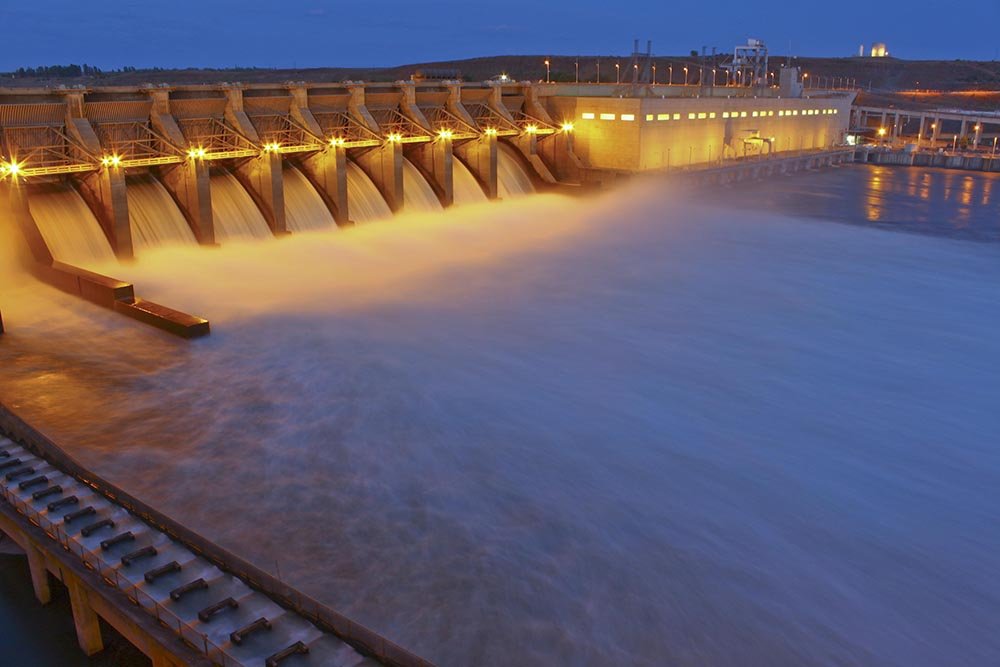Allegations of ‘secret’ deal to remove four Snake River dams aired by U.S. House GOP at hearing
The Ice Harbor Dam is located on the lower Snake River in southeastern Washington.
Republicans on a U.S. House panel blasted the Biden administration on Tuesday for an agreement they said paved the way for four dams’ removal from the Snake River in eastern Washington state.
The agreement to take steps to restore salmon populations in the Snake River that President Joe Biden announced in December with the states of Oregon and Washington and four tribes in the region would lead the way to removing four dams on the river, U.S. House Energy and Commerce Chair Cathy McMorris Rodgers and other Republicans on the committee’s Subcommittee on Energy, Climate, and Grid Security said at a hearing.
Government and academic studies have suggested that Snake River dams are an obstacle to the recovery of endangered salmon species in the Pacific Northwest, which requires action under the Endangered Species Act. Federal agreements with tribes also require the government to maintain robust salmon populations.
Biden has publicly committed to working with tribes and states to expand salmon populations, which has been interpreted by some Republicans as an endorsement of plans to remove dams, though the administration has made no such commitment.
Still, GOP lawmakers on Tuesday repeatedly criticized the “secret” process to reach an agreement with parties in a lawsuit and said the administration should prioritize the energy, flood control and other benefits the dams bring rather than focus on the salmon populations.
“This process was never about getting results for endangered salmon,” Rodgers said. “It was a reckless pursuit of an activist agenda, a misguided mission to tear out our dams with no scientific data to back it up.”
White House Council on Environmental Quality Chair Brenda Mallory testified at the hearing that the December agreement did not commit to removing dams, but left that decision to Congress.
“Let me be clear, the agreement does not usurp congressional authority on whether to breach any dams,” she said in an opening statement.
Leading Democrats on the panel, subcommittee ranking member Diana DeGette of Colorado and full committee ranking member Frank Pallone of New Jersey, echoed that point.
“My colleagues on the other side of the aisle are attempting to assert that the agreement calls for the removal of the dams,” DeGette said. “That’s simply not true. Here’s the reality: The agreement reasserts that only Congress can authorize the removal of the Snake River dams. It doesn’t mandate us to do anything.”
Removing Snake River dams under consideration
Although the administration has not authorized removing dams, that is a leading proposal to protect the river’s salmon.
Janet Coit, the assistant NOAA administrator for fisheries, said an agency study showed removing the dams would give salmon the best chance of recovery.
“In order to give the best possible chance of restoring salmon, we’d need to breach the Lower Snake River dams,” Coit said under questioning from Rodgers. “And that is to achieve the healthy-and-harvestable goal.”
Rodgers disputed there was scientific evidence proving removing dams would boost salmon populations.
Jim Matheson, the CEO of the industry group National Rural Electric Cooperative Association, told the panel that the December agreement set a course toward removal of the dams.
“It may not say breaching because Congress has to do it,” Matheson, a former member of the committee when he represented Utah as a Democrat in the U.S. House, said. “But it’s pushing everything in the direction and putting Congress in the position to do it.”
Dam removal a long-running dispute
The possibility of removing four Snake River dams — Ice Harbor Dam, Lower Monumental Dam, Little Goose Dam, and Lower Granite Dam — has long been a contentious one that has generally split along party lines.
Democrats have expressed an openness to considering removing the dams while many Republicans oppose any such measure, though Idaho Republican Mike Simpson is a notable exception.
But other Republicans in Washington, Oregon and Idaho fiercely oppose any proposals to remove the dams and their myriad benefits to the region.
“Those dams provide hydropower, transportation on barging, irrigation, flood control and recreation,” Idaho Republican Russ Fulcher said Tuesday. “The removal or breaching or bypassing would decimate the economy of the Pacific Northwest. We’re not going to stand for that.”
Still, Pallone said something must be done. The federal government has consistently lost court cases involving endangered fish in the river system. Court orders have affected the Bonneville Power Administration, which operates the dams.
“The reality is that the status quo on the river is unsustainable,” he said.
Snake River’s users complain of closed negotiations
Matheson and other witnesses representing river transportation and agriculture interests said they were kept out of the process that led to the agreement with Oregon, Washington, the Nez Perce Tribe, Confederated Tribes and Bands of the Yakama Nation, the Confederated Tribes of the Warm Springs Reservation of Oregon and the Confederated Tribes of the Umatilla Indian Reservation.
“Most people were shut out of the room,” Matheson said.
Committee Republicans said several times the negotiations were “secret,” and lacked input from affected industries and residents.
Rodgers submitted 40 letters from Pacific Northwest groups that said they were not included in agreement talks.
But Jeremy Takala, a member of the Yakama Nation Tribal Council, said the talks included the parties involved in a legal dispute.
“There was no secret negotiations,” he said. “It was a mediation.”
Takala also disputed Republican charges that the agreement was a favor to the environmental groups that carry significant influence on national Democrats.
“We’re not a radical environmentalist (group), we’re a sovereign tribal nation that has been impacted by the impacts of hydro systems and other issues since the beginning of, you know, settlers,” Takala said.

